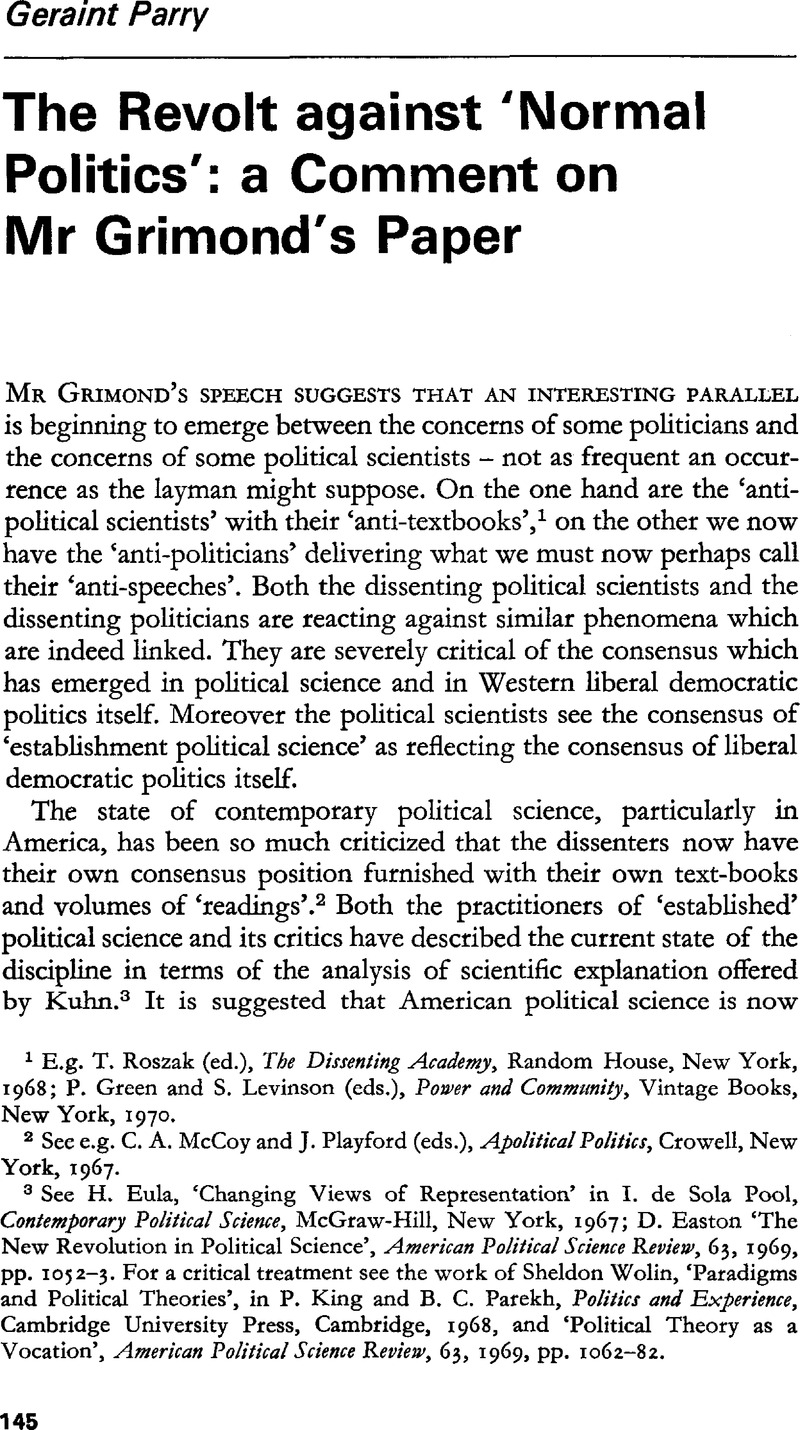No CrossRef data available.
Article contents
The Revolt against ‘Normal Politics’: a Comment on Mr Grimond's Paper
Published online by Cambridge University Press: 28 March 2014
Abstract

- Type
- A Discussion
- Information
- Copyright
- Copyright © Government and Opposition Ltd 1972
References
1 E.g. Roszak, T. (ed.), The Dissenting Academy, Random House, New York, 1968;Google Scholar Green, P. and Levinson, S. (eds.), Power and Community, Vintage Books, New York, 1970.Google ScholarPubMed
2 See e.g. McCoy, C. A. and Playford, J. (eds.), Apolitical Politics, Crowell, New York, 1967.Google Scholar
3 See Eula, H., ‘Changing Views of Representation’ in Sola Pool, I. de, Contemporary Political Science, McGraw‐Hill, New York, 1967;Google Scholar Easton, D. ‘The New Revolution in Political Science’, American Political Science Review, 63, 1969, pp. 1052–3CrossRefGoogle Scholar. For a critical treatment see the work of Wolin, Sheldon, ‘Paradigms and Political Theories’, in King, P. and Parekh, B. C., Politics and Experience, Cambridge University Press, Cambridge, 1968 Google Scholar, and ‘Political Theory as a Vocation’, American Political Science Review, 63, 1969, pp. 1062–82.
4 This criticism goes back at least to that levelled by Crick, Bernard at the heroes of American political science of the previous generation in his The American Science of Politics, Routledge, London, 1959 Google Scholar. For some current views see Bachrach, P., The Political Theory of Democratic Elitism: A Critique, Little Brown, Boston and Toronto, 1967;Google Scholar J, Peter Euben, ‘Political Science and Political Silence’ in P. Green and S. Levinson, op. cit. For an assessment of the data see Thompson, D. F., The Democratic Citizen, Cambridge University Press, Cambridge, 1970.Google ScholarPubMed
5 Wolin, Sheldon, ‘Political Theory as a Vocation’, American Political Science Review, 63, 1969, pp. 1062–82.CrossRefGoogle Scholar
6 These and related topics are discussed more fully by the contributors to Parry, Geraint (ed.), Participation in Politics, Manchester University Press, Manchester, 1972 Google Scholar. I have discussed some recent American work on power and community in ‘All Power to the Communities? Note critique, Archives Euro‐péennes de Sociologic, Spring, 1972.
7 For discussion of Mill on individualism and co‐operation see Halliday, R. J., ‘Some Recent Interpretations of J. S. Mill’, in Schneewind, (ed.), Mill, Anchor Books, 1968 Google Scholar and ‘J. S. Mill's Idea of Politics’, Political Studies, xviii, 1970, PP. 461–77.
8 See also, Halloran, J. D., ‘Community in the Urban‐Industrial Society’ in Bright, L. and Clements, S., The Committed Church, London, 1966 Google Scholar.
9 See Pateman, Carole, Participation and Democratic Theory, Cambridge University Press, 1970,CrossRefGoogle Scholar for a discussion of some of these problems.
10 See the excellent discussion by Dahl, Robert A. in After the Revolution?, Yale University Press, 1970.Google Scholar
11 See the interesting discussion by Bertram Beck, M., ‘Governmental Contracts with Non‐Profit Social Welfare Co‐operations’ in Smith, Bruce L. R. and Hague, D. C., The Dilemma of Accountability in Modern Government, Macmillan, London, 1971.Google Scholar


